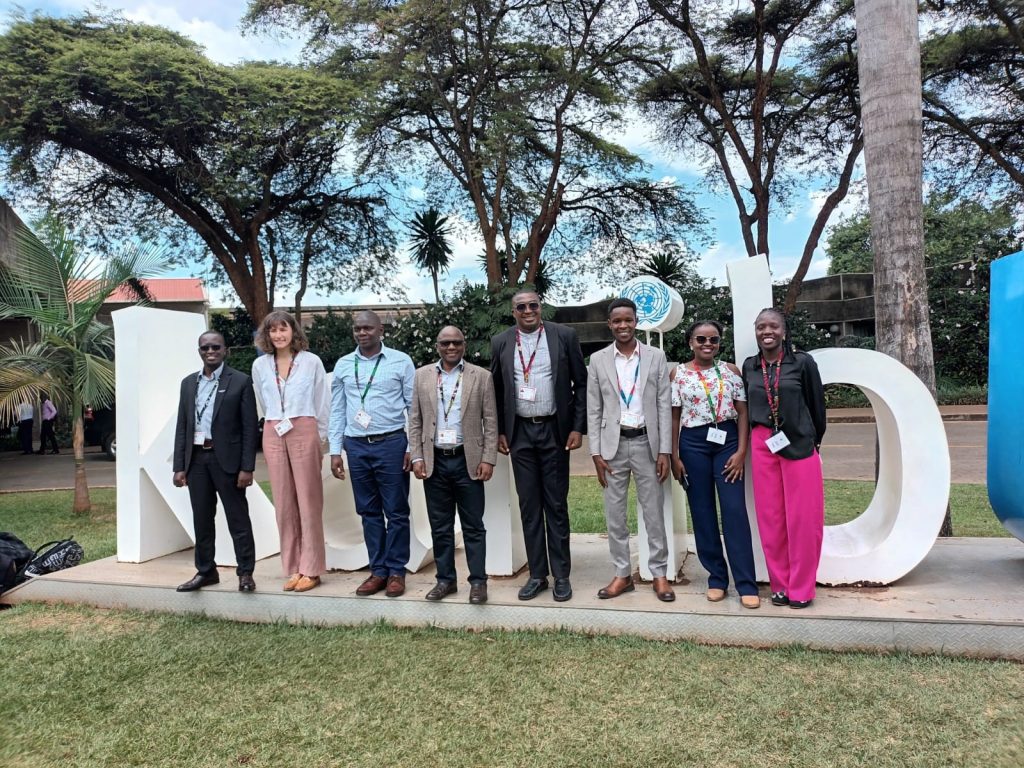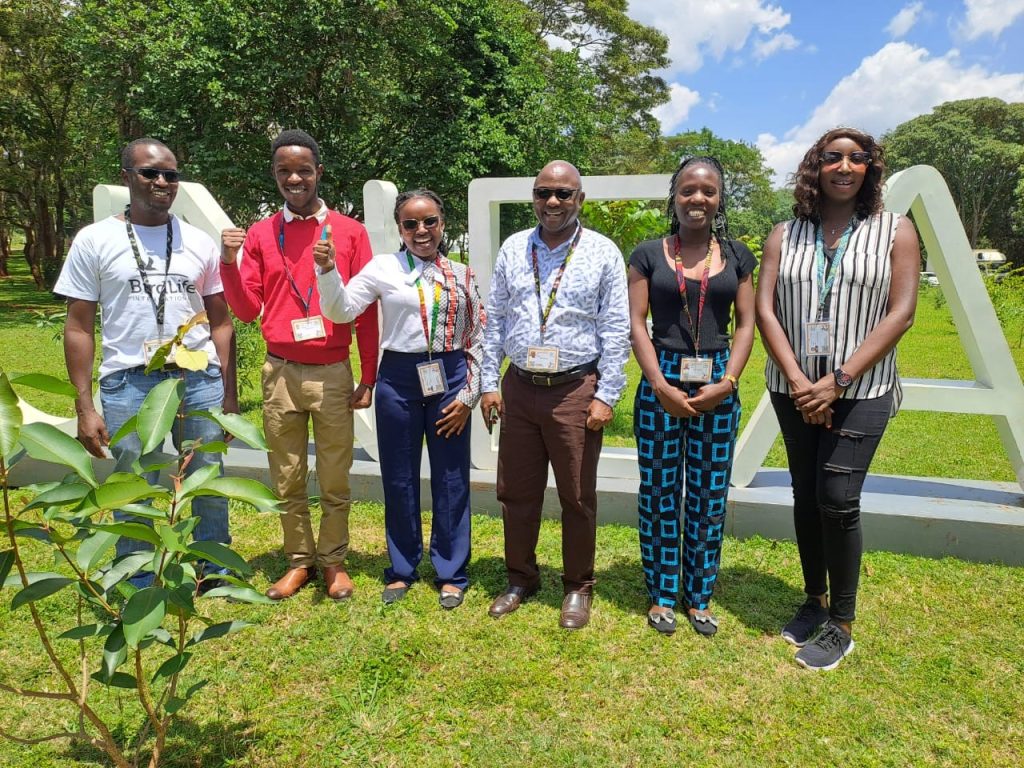Empowering Africa’s Youth in International Environmental Policy Making

BirdLife has supported the capacity building of young Africans who get the opportunity to experience global policy and law making by participating at UNEA.
The 6th session of the United Nations Environment Assembly (UNEA 6) took place from 26th February to 1st March 2024, in Nairobi Kenya. The session themed Effective, inclusive, and sustainable multilateral actions to tackle climate change, biodiversity loss and pollution was attended by more than 5,600 people from 190 countries. Established in 2012, UNEA is the highest-level meeting on the state of the environment, with member states deliberating on critical environment issues. It is also the highest decision-making organ of the United Nations Environment Programme (UNEP). UNEA has held five sessions since 2014, which have passed 90 resolutions on critical issues including biodiversity and health, Nature-based Solutions (NbS), and climate change among others.
UNEA 6 came at a time, the world that the world is grappling with the triple planetary crisis of biodiversity loss, climate change and pollution. Africa, like many developing regions is bearing the brunt of the climate crisis, though contributing least to it. Biodiversity loss is yet another issue that the continent is grappling with. In the past decade the health of ecosystems and the richness of species diversity has been declining at alarming rates, even though Africa’s biodiversity supports more than 60% of the continent’s population. Plastic pollution is yet another issue that the world is grappling with. Every year, the world produces more than 400 million tonnes of plastic, of which only 9% is successfully recycled.
Some of the key topics discussed at UNEA 6 included how to ramp up multilateral processes and promote synergies in addressing the climate, biodiversity and pollution crises, how to handle Highly Hazardous Pesticides (HHPs), NbS and how to tackle land degradation. BirdLife International is accredited to UNEP and has participated in all UNEA meetings since 2014, helping push various agenda on climate, ecosystems, biodiversity, illegal wildlife trade among others. BirdLife’s Africa team has supported the capacity building of young Africans who get the opportunity to experience global policy and law making by participating at UNEA as part of the BirdLife delegation.
For Susan Yara, Fred Kung’u, and Vicky Jackline Wanjiru, scholars pursuing PhD, Masters, and undergraduate law degree, respectively, participating at UNEA 6 was an eye openign experience. Coming from the the Centre for Advanced Studies in Environmental Law and Policy (Caselap) of the University of Nairobi (UoN), the trio had a first-hand experience as member states negotiated on various resolutions and attended related side events during UNEA.

Fred, who is also a maritime environmentalist, took part in deliberations on ocean governance as well as water policies. As a passionate advocate for marine conservation, his participation allowed him to delve deeply into discussions surrounding sea and ocean governance, while providing firsthand exposure to international environmental policy and decision-making processes.
“Oceans and sea are home to 80% of life on Earth. As guardians of these essential ecosystems, let’s take immediate action to preserve them. By embracing sustainable practices and dedicated protection, we can forge a future where life thrives both above and below the waves“, he notes.
For Vicky Jackline Wanjiru, an undergraduate student pursuing a Bachelor of Laws degree, taking part in UNEA 6 was exciting. Jackline has long been interested in the environment and climate action. Thus, she and other friends joined hands and formed the East African Campuses and Colleges Green Network (EACCGN) which seeks to raise awareness about climate action among youth. At UNEA 6, Vicky interacted with various influential figures in the environmental field, which provided valuable insights into the practical application of legal principles to address pressing environmental challenges on a global scale. Further, it enabled her to experience firsthand, diverse perspectives and innovative initiatives aimed at addressing environmental issues.
“Participating in UNEA 6 was an enlightening experience that significantly broadened my understanding of international environmental law and governance mechanisms. This experience has equipped me with the skills, knowledge, and motivation necessary to contribute meaningfully to environmental law and policy both as a student and in my future career endeavors. I look forward to continuing my journey towards promoting a healthier and more sustainable planet. With a great planet, comes great responsibility”, says Jackline.
For Susan, who is also an advocate of the High Court of Kenya, the experience enabled her to experience firsthand the process of developing Multilateral Environmental Agreements (MEAs) and resolutions and to appreciate the process of getting the final documents in addition to how countries strive to ensure that their interests are safeguarded in these processes. Further, the experience sharpened her understanding of the triple planetary crisis drivers and how they can be addressed.
With the world facing a nature and climate crisis, the scholars acknowledge that involving young people in the decision-making process is very important. In addition, there is need to change our relationship with the environment, embrace sustainable practices and include the marginalized and those bearing the greatest brunt of climate change. Ultimately, addressing the nature and climate crises requires the full implementation and enforcement of existing environmental agreements and frameworks, Further, there is need for collective effort involving governments, businesses, civil society, and individuals worldwide to tackle the crises, they add.
“The basis of our survival depends on the environment and nature. While we should be happy and excited over the resolutions passed at UNEA 6, our excitement and focus should now shift towards ensuring that these resolutions are implemented and actioned”, says Susan.

“We thank BirdLife International for giving our students an opportunity to learn practically how governments make international policy and law. The exposure has been invaluable. We are committed to strengthening this collaboration into the future, says Collins Odote, Law Professor at the University of Nairobi.
“UNEA 6 was exceptional in giving an opportunity to young Africans to engage with international policy and law making. Our intention is to bring to live the things that scholars study only in books. By doing this, we hope that in future, Africa will have informed and well-grounded policy and decision makers”, concludes Ken Mwathe, Policy, Climate and Communications Coordinator for Africa at BirdLife International.
Header Image: The BirdLife delegation at UNEA 6

“We thank BirdLife International for giving our students an opportunity to learn practically how governments make international policy and law. The exposure has been invaluable. ”
Collins Odote, Law Professor, University of Nairobi